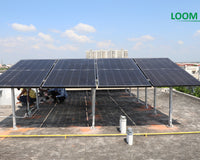Farms are critical components of our food supply chain, and the energy they consume plays a significant role in their operational costs and environmental impact. Therefore, it would be wise for farmhouses to switch from using electricity to solar energy for their operations.
Solar energy has several advantages over traditional electricity. First, solar energy is a clean and renewable source of energy that does not emit harmful greenhouse gases or other pollutants. This helps reduce the carbon footprint of farmhouses, thereby reducing their impact on the environment.
Second, solar energy is much more cost-effective than traditional electricity. In many cases, farms can significantly reduce their energy costs by switching to solar energy. The cost of solar panels has been steadily decreasing, making it more affordable for farms to invest in a solar energy system.
Additionally, solar energy can provide farmhouses with a stable and reliable source of energy. Unlike traditional electricity, which is subject to power outages, solar energy is available even in remote areas where grid access is limited. This ensures that farmhouses can continue to operate even during periods of extreme weather or other disruptions.
Moreover, solar energy systems are relatively low-maintenance, making them a more practical option for farmhouses. They do not require frequent repairs or replacements, which saves farmhouses time and money in the long run.
Switching from electricity to solar energy for farmhouse operations is a smart decision. Solar energy offers a clean, cost-effective, and reliable source of energy that can help reduce the environmental impact of farms. As the use of solar energy continues to grow, farmhouses should consider investing in a solar energy system to reduce their energy costs and contribute to a sustainable future.











